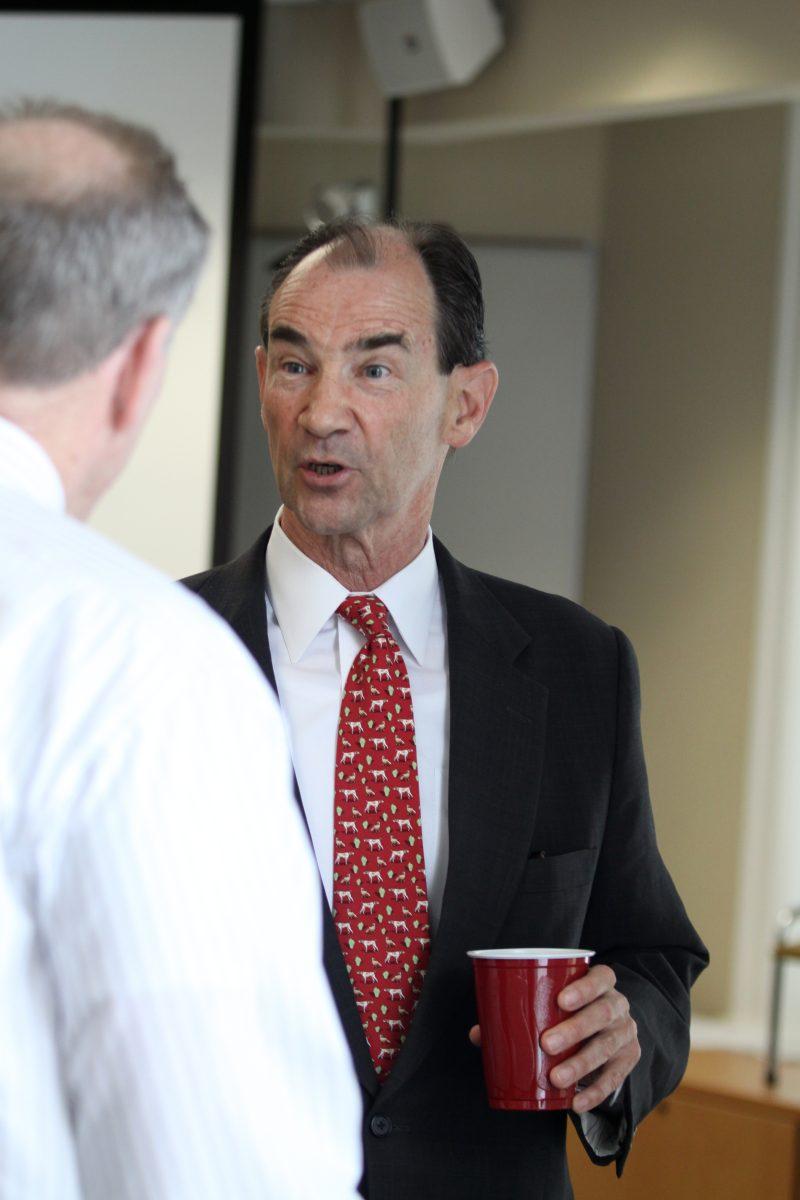Former vice president under Hugo Chávez Nicolás Maduro was elected president of Venezuela Sunday night, but the former U.S. ambassador to Venezuela didn’t hint at any congratulations during a talk on campus Monday.
It is no coincidence that former ambassador Patrick Duddy’s talk carried weight and relevance in light of current events, and the diplomat spoke about renewing relations with Venezuela. In 2008, Venezuela broke off official diplomatic relations with the U.S.
Duddy spoke Monday about problems surrounding the election held Sunday in Venezuela.
Maduro considered himself Chávez’s “hand-picked” successor, and he ran against Henrique Capriles Radonski of the opposition party. According to the National Electoral Council in Venezuela, Maduro is the president-elect with 50.66 percent of the vote, while Capriles received 49.07 percent.
Capriles demanded a recount Monday because Chavistas, followers of Chávez’s socialist ideology, control the election board in Venezuela, and election results were within a 1 percent margin. The opposition is now demanding a recount.
“Given Capriles’ track record, the results of the election are questionable,” Duddy said. “However, this doesn’t mean that the results are in fact wrong.”
Capriles, without support from Chávez, won elections against two of Chávez’ former vice presidents in gubernatorial elections. However, on the presidential level, Capriles only knows defeat — last fall he lost the election to Chávez by 10.8 percent.
Maduro’s approval ratings were up by 10 to 14 percent in the polls until last week, but Capriles revamped his campaign, Duddy said.
“Maduro had a rather unusual campaign,” Duddy said. “He claimed that he was the true son of Chávez.”
Maduro said the late Chávez visited him in the form of a small bird and that he was somehow related to the president. Duddy said these eccentric statements had the opposite effect on his campaign than he had intended.
Duddy said he met with Chávez and Maduro during his tenure as ambassador and that Maduro worked his way up the political chain from his occupation as a bus driver.
“Maduro didn’t just arrive from the bus station,” Duddy said. “He worked his way up the legislature.”
Though Chávez defeated Capriles last October, it became clear after the announcement of Chávez’s death that Capriles would run again, according to Duddy.
Joscelin Diaz, a Ph.D. candidate in biological and agricultural engineering, is a student from Venezuela who said she doesn’t support the Chavista agenda. She said she was relieved when she found out about Chávez’s death.
“I’m really hoping that everything will change and get better now,” Diaz said.
Ignacio Xavier Domínguez La Salvia, a Ph.D. candidate in computer science, said life in Venezuela is hard on everyone regardless of socio-economic status and that he thinks the Chavista socialist agenda is flawed.
For the sixth year, inflation in Venezuela has increased by 20 percent without an increase in citizen salaries. The Venezuelan national currency weakened dramatically even though the country imports almost all of its products, Duddy said.
Oil accounts for 95 percent of Venezuela’s exports and 50 percent of the government’s revenue, according to Duddy.
“The greatest damage in Chávez’s 14-year reign was the division created amongst the people,” Domínguez said.
Domínguez and Diaz said that the people in Venezuela are living in constant fear of becoming a victim of a crime — a growing problem in the country — and said “the odds are against Venezuela.”
Basic products are hard to find, utilities seldom work and the government controls everything, Domínguez said. Local and international investments, as well as private businesses, have been “scared away.”








